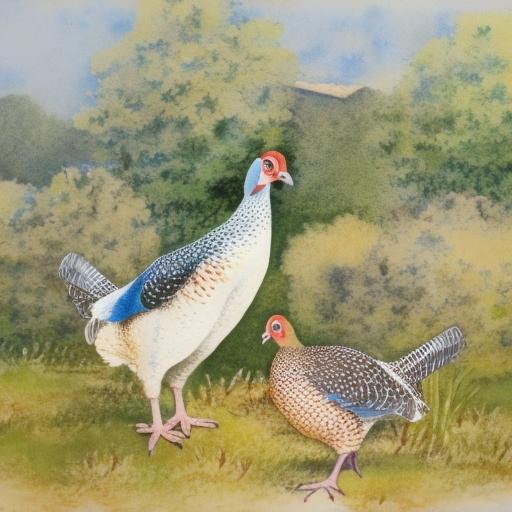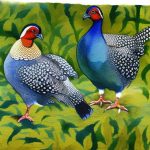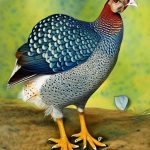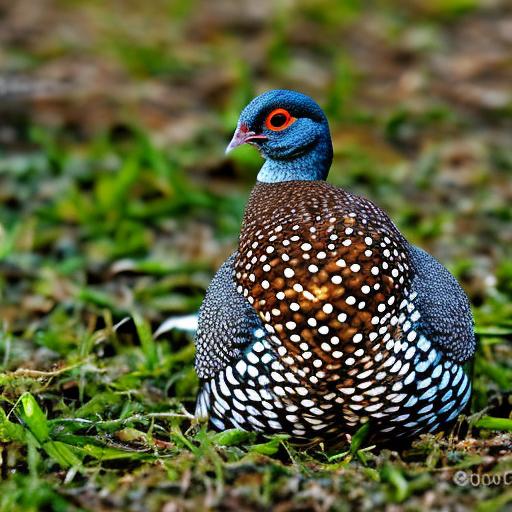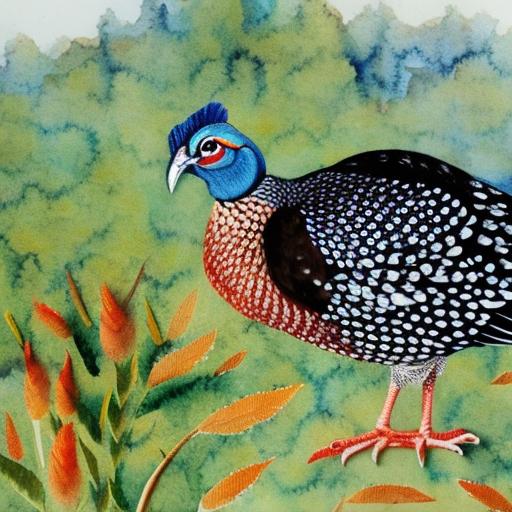Guinea fowl, also known as pintades, are domesticated birds that are native to Africa. They are popular for their unique appearance, loud calls, and their ability to control pests in the garden. Guinea fowl breeding has gained popularity among farmers and homesteaders due to their low maintenance and high productivity. Breeding guinea fowl can be a rewarding experience, but it requires careful planning and understanding of their behavior and needs. In this article, we will explore the mating behavior, nesting and egg laying habits, incubation and hatching process, chick rearing and parental care, as well as the challenges and considerations in guinea fowl breeding. Additionally, we will provide some tips for successful guinea fowl breeding to help you get started on your own flock.
Key Takeaways
- Guinea fowl breeding is a rewarding venture that requires knowledge of their mating behavior, nesting habits, and incubation process.
- Guinea fowl are monogamous birds and form strong pair bonds during the mating season.
- Female guinea fowl prefer to lay their eggs in secluded areas and will often share a communal nest with other females.
- The incubation period for guinea fowl eggs is around 26-28 days, and the hatching process requires careful monitoring of temperature and humidity.
- Proper chick rearing and parental care are essential for the health and development of guinea fowl chicks, including providing a warm and safe environment.
Mating Behavior of Guinea Fowl
Guinea fowl are known for their complex mating behavior. During the breeding season, which typically occurs in the spring and summer months, male guinea fowl will display elaborate courtship rituals to attract females. These rituals may include strutting, puffing up their feathers, and making loud calls to impress the females. Once a female is receptive to a male’s advances, they will engage in a mating dance, which involves the male circling the female while making vocalizations and displaying his colorful plumage. It is important to note that guinea fowl are monogamous birds, meaning that they will form long-term pair bonds with their mates. This means that once a pair has formed, they will remain together for the breeding season and often for multiple seasons. Understanding the mating behavior of guinea fowl is crucial for successful breeding, as it allows breeders to ensure that each pair has the opportunity to mate and produce fertile eggs.
Nesting and Egg Laying Habits
After mating, female guinea fowl will begin to search for a suitable nesting site to lay their eggs. Guinea fowl are ground nesters, meaning that they prefer to lay their eggs in hidden locations on the ground, such as under bushes or in tall grass. They are known for their secretive nesting behavior and will often go to great lengths to conceal their nests from predators. Once a suitable nesting site is found, the female will lay a clutch of eggs over a period of several days, typically laying one egg per day until the clutch is complete. Guinea fowl are prolific layers and can lay anywhere from 30 to 40 eggs in a single breeding season. It is important for breeders to provide suitable nesting areas for their guinea fowl, as well as to regularly check for and collect eggs to prevent them from being damaged or eaten by predators.
Incubation and Hatching Process
Once a clutch of eggs has been laid, the female guinea fowl will begin the incubation process. Guinea fowl are known for their strong maternal instincts and will diligently incubate their eggs for approximately 26-28 days. During this time, the female will only leave the nest briefly to feed and drink before returning to keep the eggs warm and protected. It is important for breeders to provide a quiet and secure environment for the nesting female, as disturbances can cause her to abandon the nest or lead to poor hatch rates. After the incubation period, the eggs will begin to hatch, with the chicks emerging over the course of a few days. Guinea fowl chicks are precocial, meaning that they are born with their eyes open and are able to walk and feed themselves shortly after hatching. Breeders should provide a warm and safe brooding area for the newly hatched chicks, as well as access to food and water to ensure their health and well-being.
Chick Rearing and Parental Care
Once the guinea fowl chicks have hatched, both the male and female parents will take an active role in caring for their offspring. The parents will lead the chicks in search of food and water, teaching them important survival skills such as foraging and predator avoidance. Guinea fowl chicks are highly independent and will quickly learn to fend for themselves under the guidance of their parents. However, it is important for breeders to provide a safe and secure environment for the chicks to grow and develop, as they are vulnerable to predators such as hawks, foxes, and raccoons. Additionally, providing a balanced diet of high-quality chick starter feed and access to fresh water is essential for the healthy growth of guinea fowl chicks. Breeders should also monitor the chicks closely for any signs of illness or injury and provide appropriate care as needed.
Challenges and Considerations in Guinea Fowl Breeding
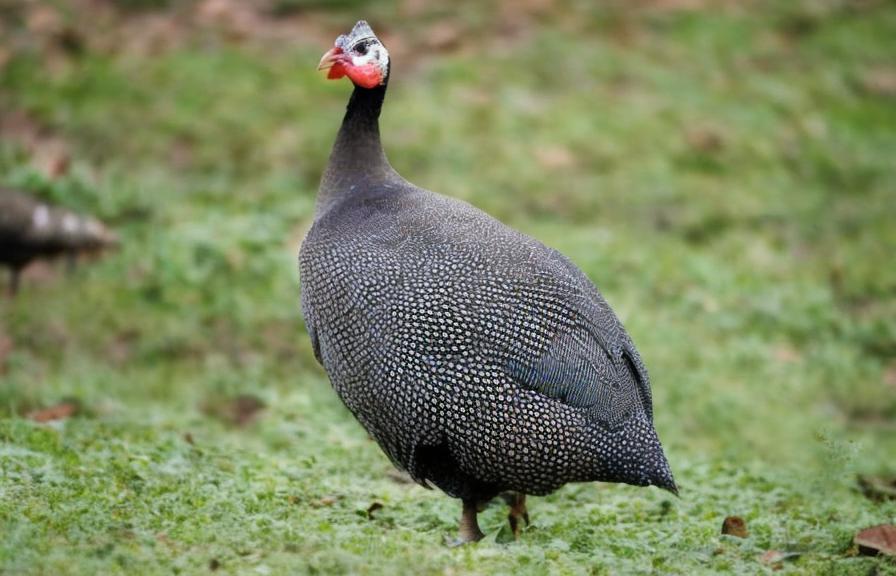
While guinea fowl breeding can be a rewarding endeavor, it also comes with its own set of challenges and considerations. One of the main challenges in guinea fowl breeding is predator control. Guinea fowl are highly susceptible to predation, especially during the nesting and chick rearing stages. It is important for breeders to implement effective predator control measures such as secure fencing, predator-proof housing, and regular monitoring of the flock. Another consideration in guinea fowl breeding is disease prevention. Guinea fowl are susceptible to various diseases and parasites, so it is important for breeders to practice good biosecurity measures, provide regular health checks, and administer vaccinations as needed. Additionally, guinea fowl can be noisy birds, so breeders should consider their proximity to neighbors when planning their breeding operation.
Tips for Successful Guinea Fowl Breeding
To ensure successful guinea fowl breeding, there are several tips that breeders can follow. Firstly, providing a suitable environment for nesting and egg laying is crucial for successful breeding. This includes providing ample nesting areas with suitable cover and protection from predators. Secondly, regular collection of eggs is important to prevent them from being damaged or eaten by predators. Thirdly, providing a balanced diet of high-quality feed is essential for the health and productivity of guinea fowl breeders should also provide access to fresh water at all times. Additionally, monitoring the health of the flock regularly and seeking veterinary care as needed can help prevent disease outbreaks and ensure the overall well-being of the birds.
In conclusion, guinea fowl breeding can be a rewarding experience for farmers and homesteaders alike. Understanding the mating behavior, nesting and egg laying habits, incubation and hatching process, chick rearing and parental care, as well as the challenges and considerations in guinea fowl breeding is essential for success in this endeavor. By following these tips and best practices, breeders can establish a healthy and productive flock of guinea fowl that will provide pest control benefits as well as a source of meat and eggs for their homestead or farm.
If you’re interested in learning more about guinea fowl breeding habits, you may also want to explore an article on the Poultry Wizard website that discusses the benefits of renting a chicken coop. This article provides valuable insights into creating a suitable environment for poultry, which can be beneficial for guinea fowl breeding as well. Check out the article here to discover how proper housing can positively impact the breeding habits of guinea fowl.
FAQs
What are the breeding habits of guinea fowl?
Guinea fowl are monogamous birds, and they typically form long-term pair bonds. They are known to be very loyal to their mates and will often stay together for life.
At what age do guinea fowl start breeding?
Guinea fowl typically reach sexual maturity at around 6-8 months of age. However, some may not start breeding until they are a year old.
How do guinea fowl choose their mates?
Guinea fowl often choose their mates through courtship displays, which can include vocalizations, strutting, and displaying their plumage. Once a pair bond is formed, they will often stay together for life.
What is the breeding season for guinea fowl?
The breeding season for guinea fowl typically occurs in the spring and summer months, when the days are longer and the weather is warmer. However, they may breed at other times of the year in warmer climates.
How many eggs do guinea fowl lay and how long is the incubation period?
Guinea fowl hens typically lay around 30-40 eggs in a season, with one egg laid every 1-2 days. The incubation period for guinea fowl eggs is around 26-28 days.
Do guinea fowl exhibit any specific behaviors during the breeding season?
During the breeding season, male guinea fowl may become more vocal and territorial, and they may engage in courtship displays to attract a mate. Female guinea fowl may also become more protective of their nesting sites and may exhibit brooding behaviors once they have laid their eggs.
Meet Walter, the feathered-friend fanatic of Florida! Nestled in the sunshine state, Walter struts through life with his feathered companions, clucking his way to happiness. With a coop that’s fancier than a five-star hotel, he’s the Don Juan of the chicken world. When he’s not teaching his hens to do the cha-cha, you’ll find him in a heated debate with his prized rooster, Sir Clucks-a-Lot. Walter’s poultry passion is no yolk; he’s the sunny-side-up guy you never knew you needed in your flock of friends!

